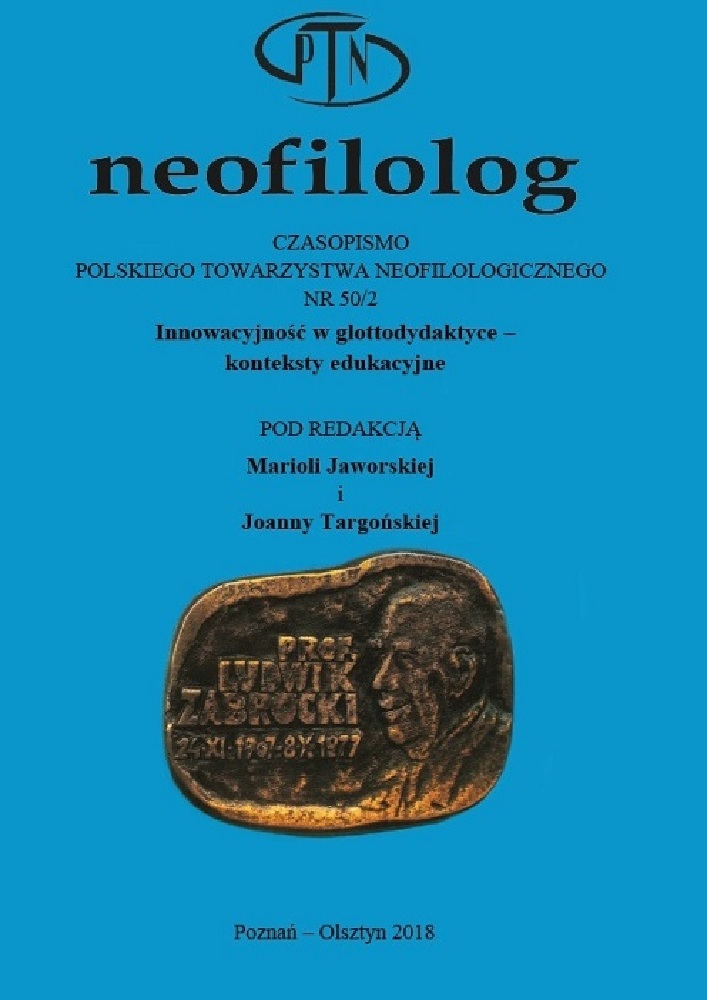Abstract
The purpose of this paper is to indicate an ambiguous understanding of the notion of innovation in education and misunderstandings connected with it. It also involves a critical analysis of the main sources of difficulty in choosing and executing pedagogical innovations, as well as encourages reflection on and mobilisation for self-preparedness to make changes in the profession. This paper will discuss arguments confirming the necessity of innovative actions in education. Examples of actual innovative actions and ostensible actions/pseudo-innovations will be given, characteristics of innovators and “Pharisees of innovation” will be presented. This paper will also demonstrate the possibilities of organising pedagogical innovations efficiently, and the possible support for innovative teachers, leading to the increase in the efficiency of their actions.References
Brzeziński M. (2009), Organizacja kreatywna. Warszawa: Wydawnictwo Naukowe PWN.
Drozdowski R. i in. (2010),Wspieranie postaw proinnowacyjnych przez wzmacnianie kreatywności. Warszawa: Polska Agencja Rozwoju Przedsiębiorczości.
Dudzikowa M. (2013), Użyteczność pojęcia działań pozornych jako kategorii analitycznej. Egzemplifikacje z obszaru edukacji (i nie tylko) (w) Dudzikowa M.,
Knasiecka-Falbierska K. (red.), Sprawcy i/lub ofiary działań pozornych w edukacji szkolnej. Kraków: Oficyna Wydawnicza Impuls, s. 28-82.
Jastrzębska E. (2013), Przygotowanie do twórczości pedagogicznej w kształceniu wstępnym nauczycieli języków obcych (w) „Neofilolog”, nr 40/2, s. 319-332.
Komorowska H. (2015), Rola nauczyciela, mity i slogany a rzeczywistość (w) „Neofilolog”, nr 45/2, s. 143-155.
Kotarba-Kańczugowska M. (2009), Innowacje pedagogiczne w międzynarodowych raportach edukacyjnych. Warszawa: Wydawnictwo Akademickie ŻAK.
Kwiatkowska H. (2005), Tożsamość nauczycieli. Między anomią i autonomią. Gdańsk: Gdańskie Wydawnictwo Psychologiczne.
Kwiatkowska H. (2008), Pedeutologia. Warszawa: Wydawnictwa Akademickie i Profesjonalne.
Kwiatkowski S. (1990), Społeczeństwo innowacyjne. Warszawa: PWN.
Łobocki M. (2000), Metody i techniki badań pedagogicznych. Kraków: Oficyna Wydawnicza Impuls.
Pietrasiński Z. (1971), Ogólne i psychologiczne zagadnienia innowacji. Warszawa: PWN.
Przyborowska B. (2013), Pedagogika innowacyjności – między teorią a praktyką. Toruń: Wydawnictwo Naukowe Uniwersytetu Mikołaja Kopernika.
Puślecki W. (1992), Kompetencje innowacyjne nauczycieli – wymogi programowe i stan faktyczny (w) Schulz R. (red), Kształcenie dla innowacji pedagogicznych. Toruń: Wydawnictwo Naukowe Uniwersytetu Mikołaja Kopernika, s. 33-39.
Rusakowska D. (1995), W stronę edukacyjnego dyskursu nowoczesności. Warszawa: Instytut Badań Edukacyjnych.
Smak E. (2014), Innowatyka w edukacji. Opole: Wydawnictwo Nowik.
Śliwerski B. (1998), Jak zmieniać szkołę? Kraków: Oficyna Wydawnicza Impuls, s. 139-148.
Śliwerski B. (2013), Pozory sprawstwa reform oświatowych w III RP (w) Dudzikowa M., Knasiecka-Falbierska K. (red.), Sprawcy i/lub ofiary działań pozornych w edukacji szkolnej. Kraków: Oficyna Wydawnicza Impuls, s. 103-130.
Śliwerski B. (2017a), Dydaktycy przedmiotowi. Online: http://sliwerski-pedagog.blogspot.com/2017/06/dydaktycy-przedmiotowi.html [DW 6.06.2017].
Śliwerski B. (2017b), Kto nie z MEN, ten nie ten. Online: sliwerski-pedagog.blogspot.com/2017/05/ [DW 28.05.2017].
Zawadzka-Bartnik E. (2015), Czego powinniśmy uczyć a czego uczymy – rozważania o edukacyjnych złudzeniach (w) „Neofilolog”, nr 44/2, s. 139-153.
License
Copyright (c) 2018 Elżbieta Zawadzka-Bartnik

This work is licensed under a Creative Commons Attribution-NoDerivatives 4.0 International License.
Authors
Authors of texts accepted for publication in Neofilolog are required to complete, sign and return to the Editorial team’s office the Agreement for granting a royalty-free license to works with a commitment to grant a CC sub-license.
Under the agreement, the authors of the texts published in Neofilolog grant Adam Mickiewicz University in Poznań a non-exclusive, royalty-free license and authorize the use of Attribution-NoDerivatives 4.0 International (CC BY-ND 4.0) Creative Commons sub-license.
The authors retain the right to the free disposal of the work.
Users
Interested Internet users are entitled to use works that have been published in Neofilolog since 2017, under the following conditions:
▪ attribution – obligation to provide, together with the distributed work, information about the authorship, title, source (link to the original work, DOI) and the license itself.
▪ no derivatives – the work must be preserved in its original form. Without the author's consent, it is not possible to distribute the modified work in the form of translations, publications, etc.
Copyrights are reserved for all texts published since 2017.
Miscellaneous
Adam Mickiewicz University in Poznań retains the property right as a whole (layout, graphic form, title, cover design, logo etc.).
